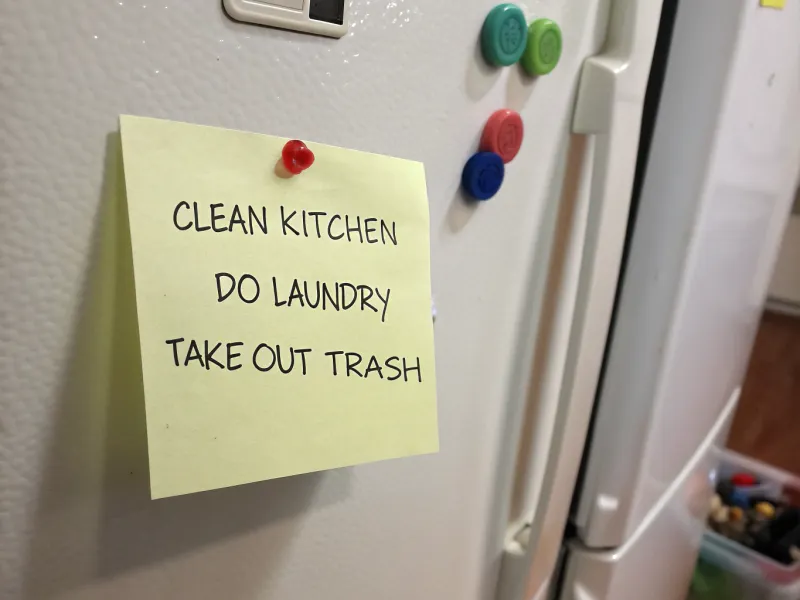17 Ways to Break the Cycle of Nagging (Plus a Few Tips for Better Communication with Your Partner)
Nagging isn’t fun for anyone. Not the one doing it, not the one hearing it, and definitely not the relationship caught in the middle.
But when you’ve asked your partner to do something for the fifth (okay, tenth) time and it still hasn’t happened, what else are you supposed to do? Spoiler: There’s another way.
You can get your needs met without the repeat soundtrack of “Can you please just…” Here’s how to break the cycle of nagging—and actually start being heard.
1. Get clear on what you really need

Is it the task—or the feeling of being heard, supported, or respected? Start there. Understanding what you truly need is key. It’s easy to get lost in the details of everyday requests, but stepping back to identify the core of your needs can clarify communication.
This isn’t about the dishes or the laundry; it’s about feeling valued and acknowledged in your partnership. By focusing on these underlying needs, you can communicate more effectively and avoid misunderstandings.
2. Say it once—clearly and calmly

Then pause. Silence can be more powerful than repetition. When you say something clearly and calmly, it creates space for listening and reflection. Too often, we repeat ourselves because we fear we weren’t heard.
But giving your partner a moment to digest can be more effective than hammering the point home. Trust in the power of your words and give them time to resonate. It’s about quality communication, not quantity.
3. Stop doing things “for them” to prove a point

That quiet resentment builds fast—and usually backfires. When you take on tasks to make a point, it often leads to frustration. Instead, communicate openly about what needs to be done and why it matters to you. This approach fosters teamwork and mutual understanding, reducing the likelihood of resentment.
It’s about building a partnership where both feel responsible and valued, rather than keeping score or proving points.
4. Pick your moment wisely

Bringing up a request while they’re distracted or stressed? Probably not ideal. Timing in communication is crucial. Choosing the right moment to speak can make the difference between being heard and being ignored. Pay attention to your partner’s state of mind and physical presence.
A relaxed, undistracted partner is more likely to engage positively. Effective communication hinges on recognizing when both parties are ready to talk and listen.
5. Ask for what you need, not what you don’t want

Instead of “you never help,” try “can you handle bath time tonight so I can rest?” By focusing on what you need rather than what’s lacking, you encourage a positive response. This shift in phrasing avoids blame and promotes cooperation.
It’s not about highlighting deficiencies but fostering a supportive partnership. Clear, positive requests can transform the dynamics of your relationship and make it easier for your partner to meet your needs.
6. Be specific

“Help more” is vague. “Can you take out the trash on Tuesdays?” is actionable. Specificity in communication eliminates ambiguity and ensures both parties understand expectations. When you’re clear about what you need, it’s easier for your partner to meet those needs.
Specific requests lead to specific actions, reducing frustration and confusion. It’s about removing guesswork and making collaboration straightforward and effective.
7. Don’t stack complaints

Stick to one thing. No snowballing into “and another thing…” When discussing issues, piling on complaints can overwhelm your partner and dilute the message. Instead, address one concern at a time, which allows for resolution and understanding.
This approach prevents defensiveness and encourages open dialogue. Focusing on a single issue helps maintain clarity and keeps the conversation productive, enhancing mutual respect and communication.
8. Use “I” language

Say “I feel overwhelmed when I do everything alone,” not “You never do anything.” Using “I” language shifts the focus from blame to personal expression. It’s about sharing how you feel rather than accusing your partner of wrongdoing.
This subtle change fosters empathy and understanding, paving the way for constructive conversations. Communicating your feelings encourages your partner to listen without feeling attacked, promoting a healthier dialogue.
9. Notice when you’re parenting instead of partnering

You’re not their mom. You’re their equal. It’s essential to recognize when you slip into a parental role, as it can create imbalance and resentment. Treating your partner as an equal fosters mutual respect and understanding.
By collaborating as partners, you build a relationship based on equality and shared responsibility. Shifting from parenting to partnering strengthens the bond and improves communication, ensuring both feel valued.
10. Drop the sarcasm

It feels sharp. Not clear. Sarcasm may seem like a harmless way to express frustration, but it often obscures the message and creates misunderstandings. Clear, sincere communication fosters trust and openness. By avoiding sarcasm, you ensure your words are taken at face value, preventing misinterpretation.
It’s about being direct and genuine, which enhances clarity and connection in your relationship, making conversations more productive and meaningful.
11. Make a shared task list

Take the mental load out of your head and onto paper (or a shared app). Collaboratively managing tasks ensures both partners are on the same page. A shared list fosters accountability and cooperation, reducing the mental burden on a single person.
It’s about working together to achieve common goals, making everyday responsibilities more manageable and less stressful. This approach nurtures a sense of partnership and teamwork.
12. Let go of perfection

They may not do it your way—and that’s okay. Accepting imperfections in yourself and your partner can transform your relationship. By letting go of the need for perfection, you make room for growth and creativity.
It’s about appreciating efforts rather than demanding flawless execution. This acceptance fosters trust and understanding, allowing both partners to feel comfortable and valued, even when things don’t go as planned.
13. Acknowledge when they follow through

Positive reinforcement > criticism. Always. Recognizing and appreciating your partner’s efforts encourages them to continue being proactive. It strengthens your bond and builds a positive cycle of communication and action.
By focusing on what they do right, you create a supportive environment that motivates both partners to engage actively in the relationship. Acknowledgment is a powerful tool for nurturing love and respect.
14. Take a beat before repeating yourself

Ask: “Am I feeling unheard—or just triggered?” Giving yourself a moment to reflect before repeating a request can change the dynamic of a conversation. It helps you assess whether the issue is truly about communication or if it’s tied to other emotions.
This pause allows you to respond more thoughtfully, reducing unnecessary tension and promoting a more measured, constructive dialogue.
15. Give space for follow-through

Not everything needs to happen immediately. Ask for a time frame. Allowing your partner the space to complete tasks at their pace fosters autonomy and respect. It shows trust in their ability to handle responsibilities without micromanaging.
By agreeing on timelines, you ensure that tasks are completed while maintaining a sense of freedom and independence, enhancing mutual respect and cooperation in the relationship.
16. Own your patterns, too

If nagging has become a habit, name it. Shift it. Recognizing and owning your communication patterns is crucial for personal growth and relationship improvement. By understanding your tendencies, you can actively work on changing them, fostering a more positive interaction with your partner.
This self-awareness enhances communication and builds a stronger, more empathetic connection, promoting a healthier, happier relationship.
17. Remember your why

You’re not trying to control them. You’re trying to connect. Keeping the core purpose of your relationship in mind can guide your communication strategies. It’s about building a meaningful connection, not controlling or dictating terms.
By focusing on love and mutual respect, you maintain a healthy perspective that enriches your partnership. This mindset fosters a nurturing environment where both partners feel valued and heard.
18. Create a weekly “check-in”

Ten minutes. No distractions. Just “how are we doing?” Regular check-ins help maintain alignment and understanding in a relationship. These moments offer a safe space to express feelings, address concerns, and celebrate successes.
By dedicating time to connect, you reinforce your bond and ensure both partners are on the same page. It’s a straightforward yet powerful way to maintain a healthy, communicative partnership.
19. Listen to understand—not to reply

Put the phone down. Make eye contact. Stay curious. Engaging in active listening means focusing on your partner’s words without planning your response. It fosters genuine understanding and empathy. By listening to understand, you create a supportive environment where both partners feel heard and valued.
This practice enhances communication and strengthens your relationship, making each conversation more meaningful and productive.
20. Validate their feelings—even if you don’t agree

“I get why that frustrated you” can go so far. Validation doesn’t mean agreement; it means acknowledging your partner’s feelings as valid and important. This approach fosters empathy and strengthens your emotional connection.
By recognizing their perspective, you build trust and openness in your relationship. It’s about creating a safe space for honest expression, even when opinions differ, enhancing mutual respect and understanding.
21. Ask more open-ended questions

Try: “What would help you feel more supported right now?” Open-ended questions encourage deeper discussions and insights. They invite your partner to express thoughts and feelings more freely, fostering a richer dialogue.
This approach promotes understanding and collaboration, helping both partners feel more connected and supported. By asking open-ended questions, you create opportunities for meaningful conversations that strengthen your relationship.
22. Avoid talking when emotions are peaking

Take a pause. Cool down. Then reconnect. Addressing issues when emotions are high often leads to misunderstandings and conflict. By waiting until both partners are calm, you ensure a more rational, productive discussion.
This pause allows for reflection and perspective, enabling you to address concerns thoughtfully. It’s about creating a space where both can express themselves without the heat of the moment clouding judgment.
23. Clarify what you’re hearing

Say: “So what I hear you saying is…” before reacting. Clarifying ensures both partners are on the same page and prevents miscommunication. It’s a simple step that can significantly enhance understanding and reduce conflicts.
By confirming what you’ve heard, you demonstrate respect and attentiveness, fostering a stronger connection. This practice promotes clear, effective communication, making interactions more positive and constructive.
24. Be honest about your communication style

“I tend to over-explain when I’m anxious.” Boom. Self-awareness. Being honest about your communication style opens the door to better understanding and adaptation. It encourages both partners to accommodate each other’s tendencies, fostering a supportive and empathetic relationship.
Transparency about how you communicate can prevent misunderstandings and build a stronger emotional connection, enhancing overall communication and partnership.
25. Use humor to soften tension

A well-timed joke? Relationship gold. Humor can be a powerful tool for diffusing tension and fostering a positive atmosphere. It lightens the mood and can help shift perspective, enabling both partners to approach issues with a more open mind.
By using humor, you create a space where both can relax and engage in more constructive, enjoyable conversations, strengthening your bond and communication skills.
26. Agree on ground rules for conflict

No yelling. No interrupting. No bringing up that thing from 2014. Establishing ground rules for conflict helps maintain respect and order during disagreements. These rules create a framework for handling disputes constructively, ensuring both partners feel safe and heard.
By agreeing on boundaries, you promote a healthier, more respectful approach to conflict, enhancing mutual understanding and cooperation.
27. Make requests, not demands

Tone matters more than you think. Making requests instead of demands fosters respect and collaboration. It shows you value your partner’s autonomy and are willing to work together. This subtle shift in approach encourages a positive response and reduces resistance.
By framing your needs as requests, you create a more supportive environment, enhancing communication and ensuring both partners feel respected and valued.
28. Be willing to course-correct

Try, mess up, try again. That’s real communication. Being open to course corrections demonstrates flexibility and a commitment to growth in your relationship. It acknowledges that mistakes happen and that both partners are willing to adapt and improve.
By embracing this mindset, you foster resilience and understanding, enhancing communication and ensuring a stronger, more supportive partnership.
29. Celebrate when you get it right

Not every convo will be perfect—but every step forward counts. Celebrating successes reinforces positive behavior and encourages continued effort. It strengthens your bond and motivates both partners to keep improving their communication skills.
Recognizing and celebrating achievements, no matter how small, fosters a positive environment that nurtures love, respect, and cooperation, making your relationship more fulfilling and joyful.







